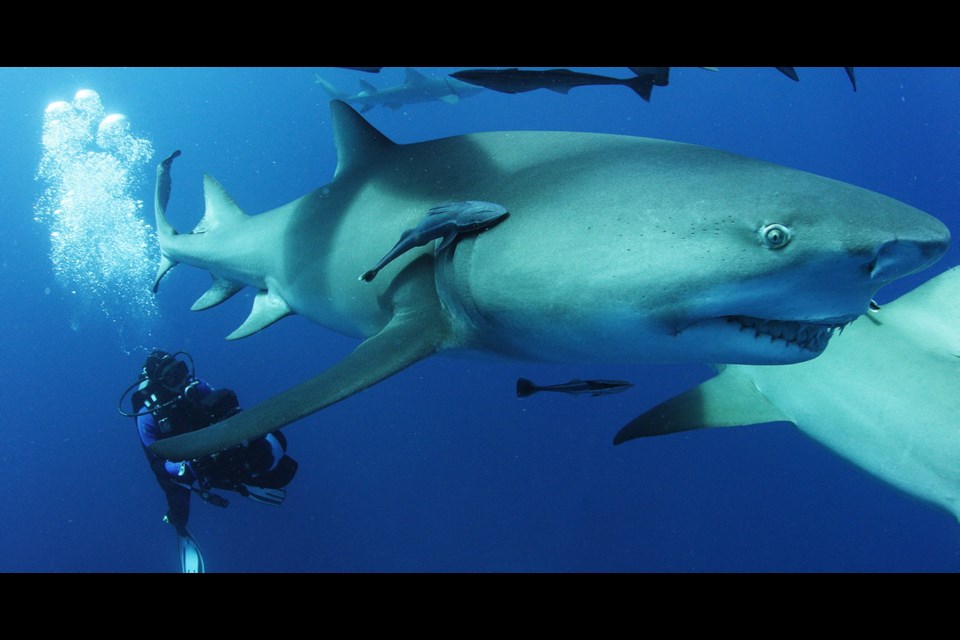What: Sharkwater Extinction
Where: SilverCity Victoria, 3130 Tillicum Rd.
Rating: PG
More than 100 million sharks are killed each year, including tens of millions of deaths that are undocumented. Which poses a serious question: Where is all that meat going?
Laboratory testing in Sharkwater Extinction, the new documentary from the late conservationist Rob Stewart, turned up some shocking results. Everything from beauty-care products to pet food and livestock feed has shark meat as an unlisted ingredient — meat that contains lead, mercury and other neurotoxins that pollute the oceans. Worse yet, the meat that makes it to restaurants and grocery stores is often mislabelled — and that’s no accident, according to the film.
When you’re eating tuna or something similar, you may, in fact, be eating shark. “What is coming off tuna-fishing vessels is not tuna, but shark,” Julie Andersen, a California-based conservationist who runs three shark-related non-profit organizations, said in an interview with the Times Colonist.
“We’ve decimated our oceans and have taken out a lot of the fish that garner a high price in the market. What we have left is shark. We’re seeing sharks being used in lieu of more valuable fish.”
Stewart’s followup to his acclaimed 2006 documentary Sharkwater looks at the billion-dollar illegal shark-fin industry and related political corruption in Costa Rica, Bahamas, Panama, Africa and the U.S. Toronto-born Stewart died partway through filming, in a diving accident off the Florida Keys. He was 37.
Sharkwater Extinction has been the subject of extensive attention since Stewart’s death. The film opens in 78 theatres in Canada this weekend, including SilverCity Victoria, a record for a documentary in Canada, according to Andersen. “The country has embraced Rob, not just as a hero, but also his cause and his mission.”
His last dive arrives an hour into the film, and shows the director excited in his effort to “go deeper than we’ve ever been before.”
To accomplish this, Stewart used a rebreather, which recirculates air and allows divers to stay under for up to six hours. He was attempting to capture rare footage of a sawfish, one of the most endangered sharks in the world, and died as a result of a lack of oxygen in his rebreather. Stewart’s family has since filed a lawsuit against his rebreather instructor, among other defendants. Andersen was part of the team that helped Stewart’s parents complete Sharkwater Extinction after his death.
“What we are trying to do is carry out his legacy as best we can. Rob was meticulous about documentation and he left us incredible plans for what he wanted to achieve over the next 10 and 20 years. It’s not just about Sharkwater Extinction — it’s about all these other movies and all these other movements and things that he wanted to accomplish.”
Shark finning — the process by which valuable fins are removed from live sharks — is now banned in most of the world, thanks to Sharkwater. But a new battle has emerged. The industry has gone underground, which is the focus of Sharkwater Extinction. Stewart was passionate about reducing the killing of sharks for human consumption and he felt like he was making headway, Andersen said. “The word is out around the world that sharks mean money,” Stewart says in the film.
Shark meat is listed under 18 aliases that don’t contain the word “shark” — in English alone, Andersen said. “Rock salmon, flake, ocean whitefish — these are in fish patties, imitation crab. And that’s shark. One out of every two times you eat fish, you get a different species from what you think you ordered.”
There is hope, both in Canada and abroad. California Governor Jerry Brown passed legislation on Sept. 27 to ban by 2023 drift gillnetting, a catch-all practice that drastically affects the sea turtle, dolphin, sea lion and whale populations. “That was all because of this film and the footage that Rob captured and provided to lawmakers,” Andersen said.
Canada is the largest importer and exporter of shark fin outside Asia, as shark fishing happens legally in Canada. Stewart was proud of his country’s efforts, however, especially at the governmental level.
He had a working relationship with B.C. Green Party Leader Andrew Weaver, and Stewart played an active role in a recent bill sponsored by Conservative Sen. Michael MacDonald. The Ban on Shark Fin Importation and Exportation Act was passed unanimously by the Senate Standing Committee on Fisheries and Oceans and is moving to the Senate for adoption in the Commons in the coming weeks, according to reports.
If successful, Canada would become the first country to ban the import and export of shark fin. “I feel a lot of hope in Canada,” Andersen said. “But in the U.S., we’re going backward.”
Andersen visited Victoria several times with Stewart after Sharkwater was released. They found sympathetic partners in former Glenlyon Norfolk Middle School instructors Margaret McCullough and Jen Harvey, who hosted them at the school on several occasions. The teachers co-founded the Victoria chapter of Fin Free, a global campaign against the mass slaughter of sharks.
Four countries had banned shark finning when Sharkwater started filming in 2006. After its release, the number rose to 16. Now, 90 countries have banned the process. As for the impact she expects from Sharkwater Extinction, Andersen believes Stewart’s reputation will be the catalyst for yet more change.
“People think they are doing humanity a service by taking sharks out of the ocean. Why save sharks, these beasts that need to be eradicated at any cost? I don’t think enough people think enough about how everything is linked together.
“Any shark fishing, in my opinion, can’t be sustainable. We need to give sharks a respite. If we do that, the population will rebound very quickly. They are 450 million years old and have survived five major extinctions for a reason.”



